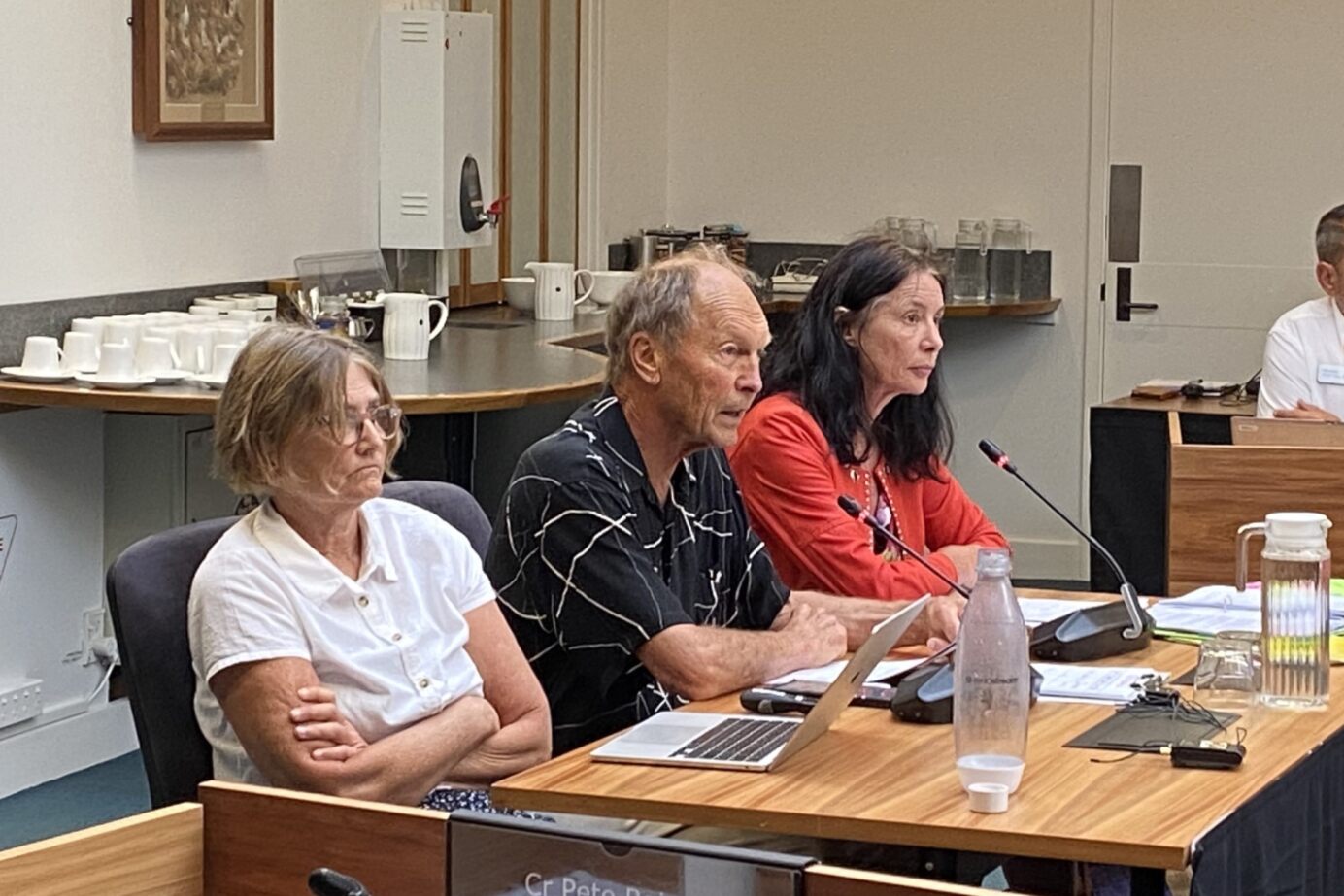Nelson council rejects plea to halt fluoridation


Nelson Clean Water Coalition representatives Dr Caroline Wheeler, Dharan Longley, and Sue Grey requested the council delay fluoridating the city's water. <em>Photo: Max Frethey.</em>
Nelson’s water is set to be fluoridated next year despite vocal opposition from a local lobby group.
Health officials and fluoride opponents spent more than an hour presenting to and being questioned by the city’s elected members during a protracted public forum on Thursday as the city approaches a Ministry of Health deadline to begin fluoridation.
Representatives of the anti-fluoride Nelson Clean Water Coalition objected to fluoridating the city’s drinking water, expressing concerns about “mass medication” and disputed the health benefits of fluoride, labelling the chemical a “neurotoxin”.
“The ratepayers and residents expect council to put us first, not submit to a coercive Government directive that overrides our local decision-making about our water,” said convenor Dharan Longley.
“Everyone deserves the right to personal choice, that is body sovereignty.”
Lawyer Sue Grey, who verbally sparred with Mayor Nick Smith over allegations the city had begun fluoridating its water in October, supported Dharan.
She asked the council to “find the courage” to reject the Ministry directive and to instead follow in the footsteps of Whangārei District Council which rejected the directive last week.
However, Ministry of Health officials were adamant that fluoridation was a safe, efficient, affordable, and equitable measure that improves oral health.
Deputy director of public health, Dr Richard Jaine, said fluoridation was a “well-established” public health measure with more than 60 years of global evidence supporting its effectiveness.
“Studies show that children and adults living in areas with community water fluoridation have significantly less tooth decay than living in areas without.”
He drew attention to the high rates of tooth decay, particularly amongst New Zealand’s Māori, Pacific, and deprived children.
Community water fluoridation lowered lifetime incidence of tooth decay by 40 per cent among children and adolescents, and reduced hospital admissions for tooth decay treatment for children aged 0-4 by 48 per cent, Richard said.
This year, the Ministry of Health reviewed the evidence of the safety and effectiveness of fluoridation and continues to conclude there is “no significant public health risk”.
Speaking after the public forum, Richard added that recent articles from the United States, which suggest that fluoride poses a neurodevelopmental risk to children, looked at higher levels of fluoride than what New Zealand fluoridates at.
Nelson, along with 13 other councils, was directed by then Director-General of Health, Dr Ashley Bloomfield, in July 2022, to fluoridate its drinking water.
In November 2023, the directives were declared unlawful by the High Court because Bloomfield had not given consideration to the Bill of Rights Act.
On Tuesday, current Director-General of Health, Dr Diana Sarfati, wrote to the council saying that consideration had now been given to the act, and that the directive was reconfirmed.
The city’s deadline for fluoridation is 31 December, however the requirement to fluoridate proved controversial for councillors Trudie Brand, Mel Courtney, and Tim Skinner.
Brand was not convinced the Ministry had exhausted other options for improving oral health before fluoridating drinking water, while Courtney objected to the Government mandating an action from the council.
The council has previously supported a now-enacted law change that removed the responsibility of fluoridating drinking water from local government and gave it to health officials.
But Mayor Nick Smith was forceful in his support for fluoridation, highlighting the 186 local children under 14 who received hospital care for preventable tooth dental conditions in 2023.
“The issue of fluoridation is really a question of do we back science, do we back our health professionals, and do we back our most disadvantaged children?”
A resolution, noting that Director-General of Health’s direction requiring the council to fluoridate its drinking water, was passed by elected members, 10 votes to three.

